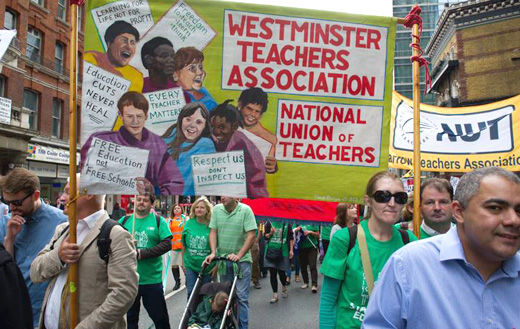
LONDON – The Conservative-led coalition government in the UK has embarked on a “shock therapy” deregulatory binge across the English education sector. This isn’t a radical break with the prevailing policy orthodoxy. The rot set in years ago and wasn’t really challenged during the 13 years of New Labour government. While New Labour invested in education, it also subscribed to the neoliberal orthodoxy that the market and private sector competition could make it more efficient.
Schools outside of democratic control
It was New Labour that brought in the idea of “city academy” schools as a solution to “failing schools.” Obsessed with the idea that education and the knowledge economy could effectively replace “redistributory” policies (which would have posed a threat to big business and finance capital), New Labour created a class of schools outside of democratic control, controlled by private sponsors and given the freedom to deviate from nationally agreed contractual terms and conditions of employment for their teachers. These schools were a gift to the incoming Conservative-led coalition.
Conservatives had long sought to undermine democratic oversight of a comprehensive system, and under the coalition, the new Tory education secretary, Michael Gove, has seized his opportunity with alacrity. In 2010, Gove announced that the English school system was in crisis, that a generation of children was being let down by comprehensive schools that stunted their ambition. The solution, he announced, was to convert schools into academies and remove them from democratic control.
Using a mixture of outright bribery through promises of extra funding and coercion, using the immense pressure on schools found to “require improvement” by a highly politicized inspectorate – Ofsted, Gove powered a process that ensured that English secondary schools felt they had little option but to convert to academy status. Fifty-six percent of all English secondary schools are now academies, but given the political pressures on their governors (in the UK, all state-run schools – what we call public schools – have volunteer governing bodies), the wonder is that so many have held out.
In an effort to force the pace, the Conservative-led coalition also passed new legislation enabling the establishment of new schools, called “free schools.” In legal terms these are simply academies by another name but “free schools” were sold to the public as empowering local parents to set up their own schools without the need for tiresome red tape or even qualified teachers. The law establishing these schools has been written in such a way that they can be established on the basis of demand that only has to be evidenced by a scrap of paper with a few hundred names on it.
No coordination, no planning, no assessment of need, no consultation. These schools have not been established to create extra capacity or to address any objective need – in spite of the fact that there are genuine problems in many areas. Instead, the government seems to see them as lean, mean predators, making efficient use of their state stipends to out-compete their local comprehensives, driving “failing schools” out of business.
Inevitably, this neoliberal supply-side revolution has pump-primed the emergence of substantial academy “chains,” companies like Ark, E-Act, Harris, AET, United Learning, Oasis and others. The 12 largest chains now control more than 400 academy schools, around a quarter of all English secondary academies. These companies are now increasingly also applying to set up “free schools.” The number of private companies applying to run “free schools” tripled in two years with 25 percent of applications coming from a corporate sponsor in 2013, giving the lie to Gove’s lofty words about parent power.
For the moment, these companies are established on a charitable basis and cannot make profits that can be distributed to shareholders. But they are already lobbying the government to be allowed to run schools for profit. Right-wing think tanks like the Institute of Economic Affairs and Policy Exchange, very closely connected with the City of London financial institutions and the Coalition government, have already prepared the public arguments for the efficiency of for-profit schools.
Behind the scenes, the academy chains are reported to be lobbying for the right to be allowed to borrow against their assets, levering in the private equity companies and hedge funds circling the sector with their promises of easy capital and fast expansion. The political environment is not quite right yet. The Conservatives’ coalition partners the Liberal Democrats are distinctly queasy about schools run for profit. But if the Conservatives win a majority in the next general election, for-profit schools will be back on the agenda.
If all this sounds very familiar to U.S. audiences, it should. Michael Gove has been learning from the USA, spending time on a fact-finding mission recently with neoconservative education reformers and giving a keynote address at Jeb Bush’s Foundation for Excellence National Summit late last year. Right-wing think tanks in the UK have drawn heavily on the “success” of the charter schools movement to legitimate the government’s reforms.
This is no mere accident. The UK’s coalition government is effectively the parliamentary wing of the vast, organized political and economic power of the City of London (equivalent to “Wall Street” in the U.S.). Its macroeconomic policy and its political attack on the public sector are both designed to restart the City’s casino, partly by feeding it with new assets. And “the City” may sound quaintly English, but behind its antiquated name the reality is that it is dominated by U.S.-owned banks and financial interests. Finance capital in Britain is Anglo-American and its political representatives take a similarly transatlantic perspective.
It shouldn’t surprise anyone that such a government is looking to roll out a public service reform agenda already developed in the U.S., whose ultimate objective is to financialize our beleaguered school and university system, creating new equity and new classes of financial assets for the speculators in the process.
Resistance is growing
But while the investment banks and private equity funds circle, resistance is growing. For-profit education has taken a hefty blow recently with the revelation that the government’s seismic deregulation of higher education, geared in large part to allowing in U.S.-owned for-profit companies and financializing the existing university infrastructure, is generating a repeat of recent U.S. history. The government opened up a loophole that allowed for-profit companies access to the publicly backed loan program.
In 2010, they accounted for a mere £22 million (over $37 million) in subsidies through this route. By the end of this year that figure will be almost £1 billion ($1.7 billion). And some of these companies have now been caught scamming the government’s student loan system in precisely the way that U.S. companies have done for years, and exactly as the University and College Union, which organizes higher education faculty, warned they would.
Similarly, the neoliberal assault on local authority public comprehensive schools is coming off the rails. The “free schools” project has produced a series of disastrous and high profile scandals, the entirely predictable consequence of setting up and funding completely unregulated schools run by inexperienced, inept, unsupported and sometimes corrupt governors.
The vast amounts of public money being sunk into these schools have become a major embarrassment, compounded by the recent revelation that Gove has had to raid the budget for primary schools to the tune of £400 million ($679 million) to fund their ballooning cost. The academies program too is running into problems as the rapid expansion of chain companies outruns their ability to manage schools. Fourteen academy chains were told to stop expanding. One, E-Act, was told to hand back 10 schools to the government, while the Prospects Academies Trust is shortly to close completely.
Grassroots pressure
As the policy problems have become more apparent the Labour Party has inched, painfully, toward a pragmatic rejection of its former enthusiasm for deregulating the schools sector. The key to turning this into a positive alternative education program will be raising the level of grassroots pressure. Fortunately, the coalition government is proving very helpful. In its determination to drive change ruthlessly in the face of any opposition, the government is fueling a democratic backlash.
Michael Gove has gone out of his way to goad British teaching unions into industrial action, believing he can smash their influence in the education sector. In addition to facing localized attacks on their terms and conditions as a consequence of academization, teachers have seen their pensions cut, the introduction of more performance-related pay, attempts to lengthen their working day and a steady stream of attacks in the big business press. But ironically, one consequence has been to create more pressure for professional unity among the notoriously divided teaching unions. It is apparent to ever more teachers that divided unions are actively impeding effective collective action.
Equally positive are the attempts by the National Union of Teachers to link industrial and political resistance to a growing community backlash. As the Department for Education has accelerated its efforts to drive schools into academy status and open more “free schools,” it has become increasingly widely apparent that the interests of parents and their communities come a very poor second to the broader project.
Schools have been forced to become academies in the face of overwhelming community opposition. Free schools are being opened where there is no need, on the basis of no consultation. And as the chains and religious organizations running these schools are increasingly exposed to public scrutiny, there is the potential to turn a basic common-sense democratic opposition to these reforms into support for a positive democratic education agenda. The urgent priority now is to build organizational unity between educators and their communities across the country, based on the rising democratic revolt against the education counter-revolution.
Jonathan White is active in education struggles in the UK and organizes a local campaign against academies and “free schools” in London.
Photo: National Union of Teachers members march and rally in London, June 25, 2013. Nut Campaigns Facebook page.












Comments